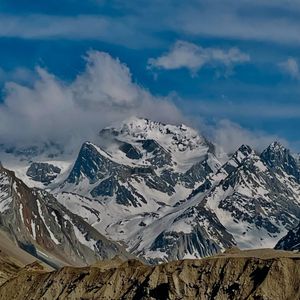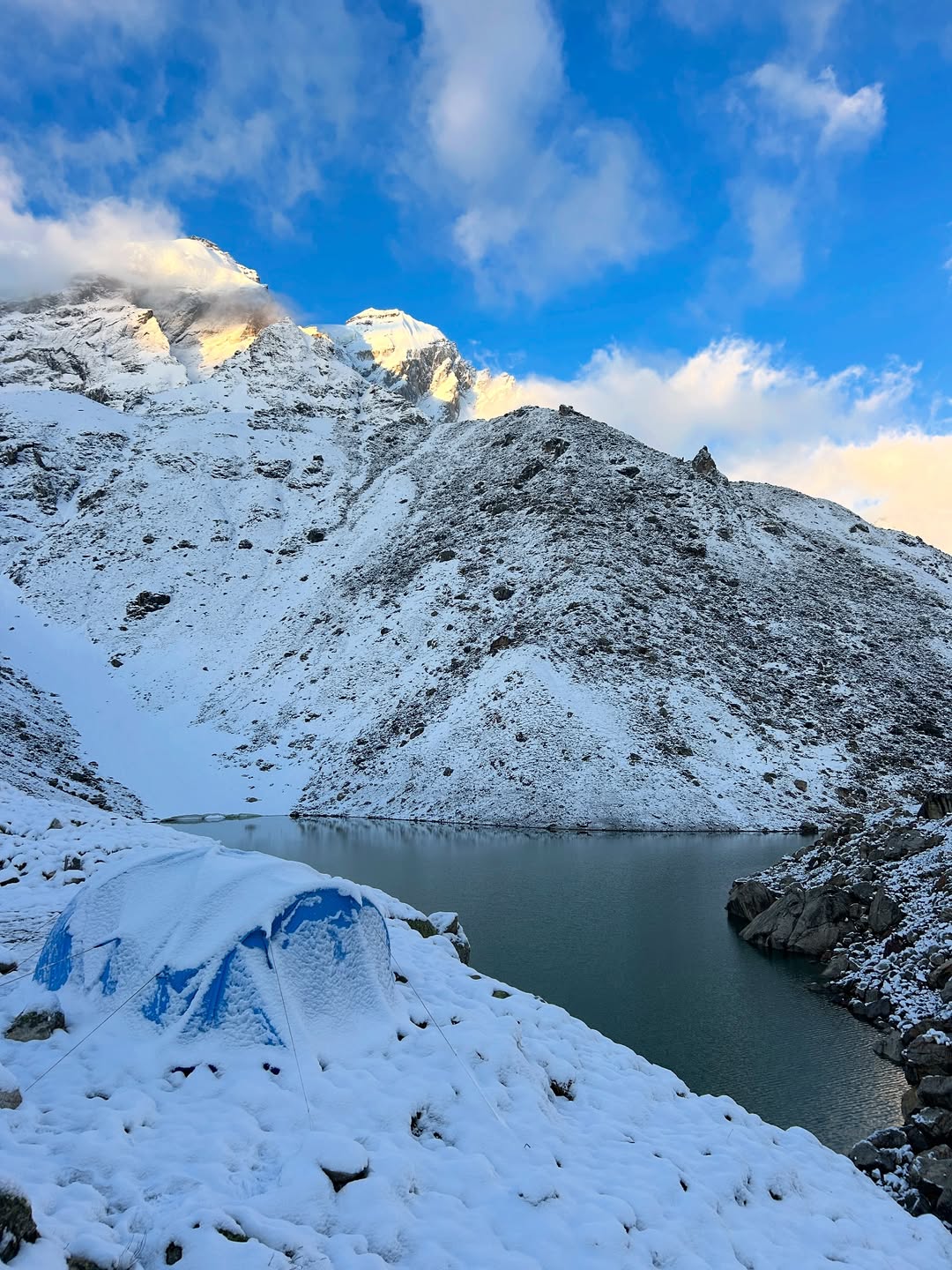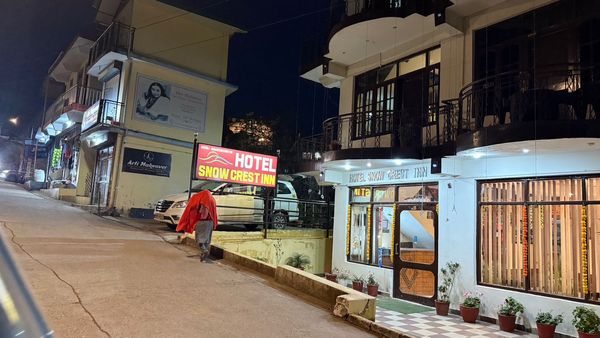7 Remote Himalayan Trails Steeped in Mythology
 Deepanshu Negi
12 Aug, 2025
10 mins read
25
Deepanshu Negi
12 Aug, 2025
10 mins read
25

High in the Himalayas of Uttarakhand, some trails are more than just paths through the mountains they are journeys through time, faith, and legend. These remote routes lead to sacred peaks, hidden temples, and pristine alpine lakes that have been revered in local folklore for centuries. Each step offers a blend of breathtaking scenery and deep cultural significance, making these treks ideal for travelers who seek both adventure and spiritual connection.
1. Adi Kailash and Om Parvat
Quick Facts
- Altitude: 15,500 ft (Adi Kailash)
- Level: Easy
- Best Time: May to October
Adi Kailash, often called the "Chhota Kailash," is a sacred mountain in the Pithoragarh district of Uttarakhand. Thanks to road connectivity up to Nabhidhang and Gunji, much of the journey can be done by vehicle, making it accessible even to those with limited trekking experience. Short, scenic hikes lead you to Om Parvat, where a natural snow formation resembles the sacred ‘Om’ symbol, and to viewpoints offering breathtaking Himalayan panoramas.
This region is more than just a visual wonder it’s deeply rooted in Hindu mythology. Pilgrims believe that Adi Kailash holds the same spiritual significance as Mount Kailash in Tibet. The route passes through charming Himalayan villages, ancient temples, and tranquil landscapes, allowing travelers to combine cultural immersion with spiritual reflection. Whether you’re visiting for devotion, photography, or simply the serene atmosphere, this trail offers a fulfilling Himalayan experience without the physical demands of a long expedition.
2. Satopanth Tal
Quick Facts
- Altitude: 15,100 ft
- Level: Moderate
- Best Time: June to September
Satopanth Tal is a high-altitude glacial lake near Badrinath, believed to be a divine meeting place of the Hindu trinity Brahma, Vishnu, and Mahesh. The emerald-green waters rest amidst sharp snow-clad peaks, including Neelkanth, Chaukhamba, and Balakun. The trek to this sacred site passes through Vasudhara Falls, alpine meadows, and rocky moraines, offering a blend of natural grandeur and spiritual significance.
Locals believe the lake’s triangular shape represents the three deities, and pilgrims visit seeking blessings and purity of mind. The trail also carries the echoes of Mahabharata legends, with tales of the Pandavas’ final journey to heaven. While the route demands good fitness due to steep ascents and altitude, it rewards trekkers with both serenity and a sense of timeless mythology woven into the Himalayan landscape.

3. Rudranath
Quick Facts
- Altitude: 11,800 ft
- Level: Moderate
- Best Time: May to October
Rudranath is the highest of the Panch Kedar temples and is dedicated to Lord Shiva in his Rudra form. The temple sits in a peaceful alpine meadow surrounded by towering peaks, making the approach as spiritually uplifting as the destination itself. The trek takes you through dense rhododendron forests, grassy ridges, and scenic villages untouched by mass tourism.
According to legend, the Pandavas built this shrine to atone for their sins in the Kurukshetra war. The location’s tranquility is unmatched, with mist curling around the temple and the chants of pilgrims blending into the sounds of nature. Staying overnight here allows you to witness magical Himalayan sunsets and sunrises moments that feel like nature’s own prayer.
4. Kagbhusandi Lake
Quick Facts
- Altitude: 17,060 ft
- Level: Difficult
- Best Time: June to September
Perched high above the Alaknanda Valley, Kagbhusandi Lake is a glacial water body surrounded by snow-draped peaks. The lake is named after a mythical crow (Kag) who is believed to have been a learned sage cursed into avian form. Its still waters mirror the grandeur of peaks like Hathi Parvat and Neelkanth, creating postcard-perfect reflections.
The journey is a demanding one, involving steep ascents, rocky moraines, and narrow ridges, but it’s also deeply rewarding. Apart from natural beauty, the trail immerses you in Garhwali folklore and rare alpine flora. Few trekkers venture here, making it a truly remote experience where mythology, wilderness, and raw Himalayan energy come together.
5. Kartik Swami
Quick Facts
- Altitude: 8,500 ft
- Level: Easy
- Best Time: October to June
Kartik Swami Temple is perched atop a narrow ridge in Rudraprayag district, offering panoramic views of the snow-covered Garhwal Himalayas. Dedicated to Lord Kartikeya, the temple is said to be the spot where he offered his bones to Lord Shiva, symbolizing ultimate devotion. The short trek begins from Kanakchauri and winds through pine forests and open ridges.
Though relatively easy, the hike is immensely rewarding sunrises here paint the Himalayan horizon in shades of gold and pink. On clear days, peaks like Chaukhamba, Neelkanth, and Bandarpoonch stand in sharp relief against the sky. For devotees and casual travelers alike, the blend of myth, scenery, and accessibility makes Kartik Swami a memorable Himalayan escape.
6. Madhyamaheshwar
Quick Facts
- Altitude: 11,450 ft
- Level: Moderate
- Best Time: May to October
Madhyamaheshwar is another revered shrine in the Panch Kedar circuit, located in a pristine valley surrounded by lush meadows and snow-capped mountains. The temple, dedicated to the navel form of Lord Shiva, is believed to have been built by the Pandavas after the Kurukshetra war. The trek passes through remote villages, terraced fields, and rhododendron forests.
What makes this trail special is its peaceful ambiance and close connection to Garhwali traditions. An optional climb to Buda Madhyamaheshwar offers a 360-degree view of Chaukhamba, Kedarnath, and Neelkanth peaks an experience that blends spiritual fulfillment with raw Himalayan beauty.
7. Nanda Devi Base via Lata Village
Quick Facts
- Altitude: 13,100 ft
- Level: Moderate to Difficult
- Best Time: May to June, September to October
This trail offers a rare opportunity to enter the buffer zone of the Nanda Devi Biosphere Reserve, a UNESCO World Heritage Site. Starting from Lata Village, the route follows ancient pilgrimage paths used by locals for centuries. The trek grants majestic views of Nanda Devi, India’s second-highest peak, and explores high-altitude meadows rich with wildflowers.
In local mythology, Nanda Devi is revered as the goddess of the mountains, and the surrounding region is treated as sacred ground. Strict regulations protect its pristine environment, so trekking here feels like stepping into a living temple of nature. For those seeking both challenge and cultural immersion, this trail is a rare and rewarding journey.
Conclusion
From easy pilgrim paths to challenging alpine routes, these seven remote Himalayan trails are more than just trekking destinations they are living stories, passed down through generations. Each path connects the modern traveler to ancient legends, sacred landscapes, and timeless Himalayan beauty. Whether you seek devotion, adventure, or both, the mountains are ready to share their myths with those willing to walk their trails.
Written By:
Deepanshu Negi



Hotels at your convenience
Now choose your stay according to your preference. From finding a place for your dream destination or a mere weekend getaway to business accommodations or brief stay, we have got you covered. Explore hotels as per your mood.


